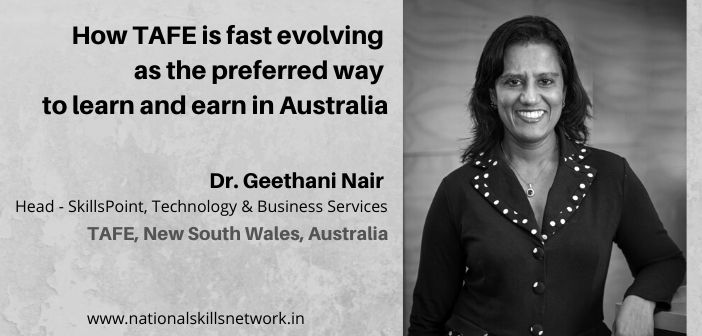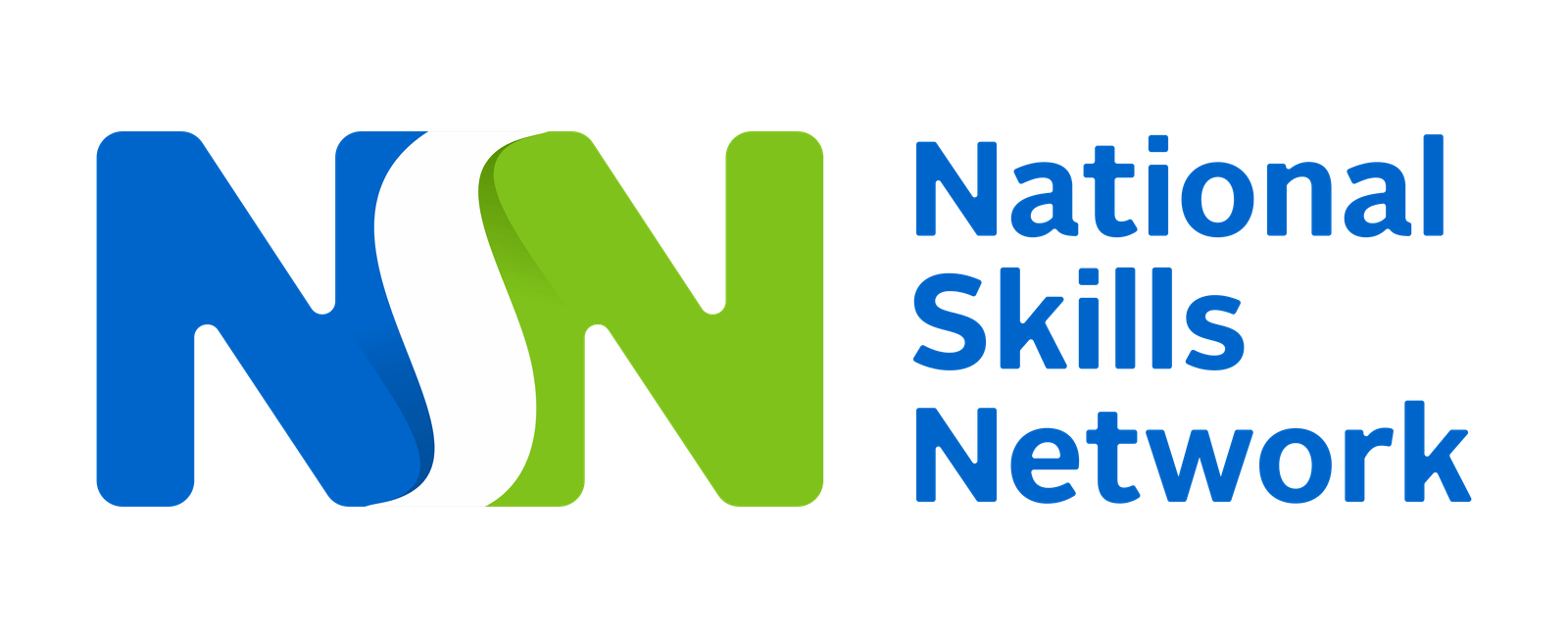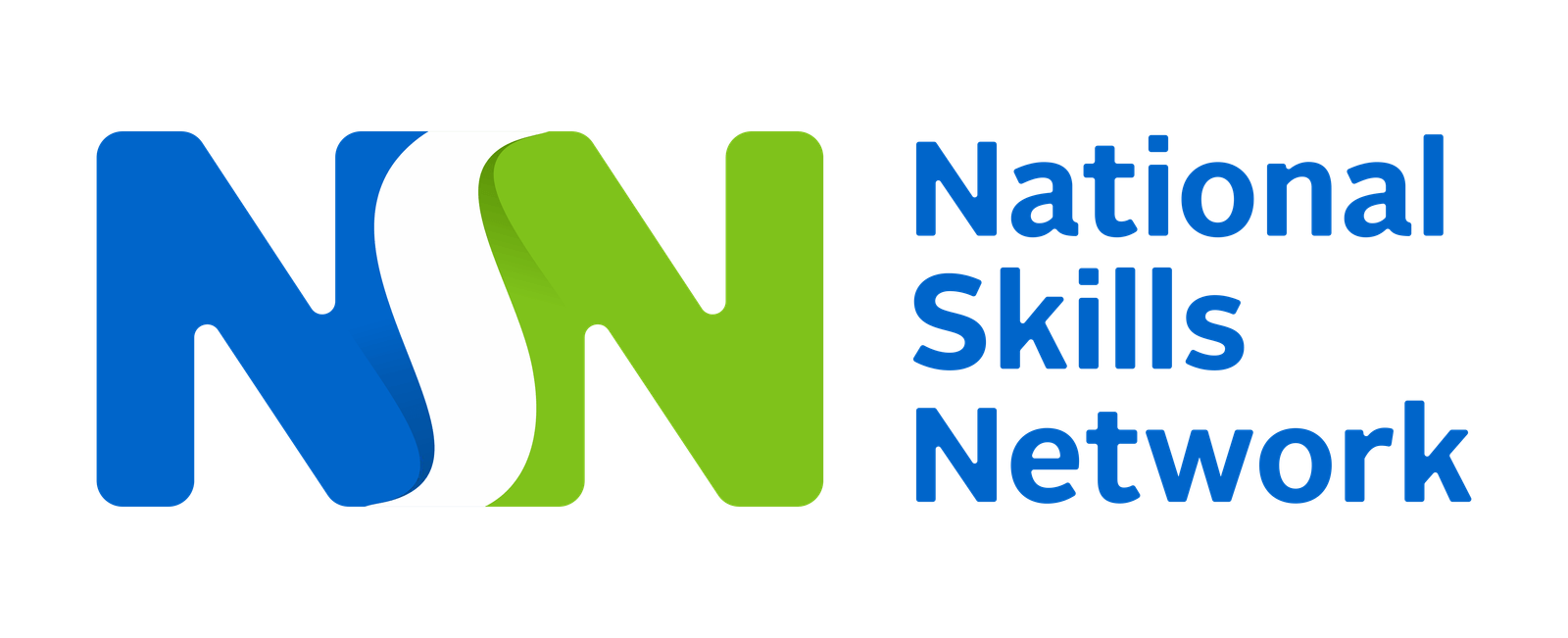A wide range of practically designed courses, small class sizes, individual attention, apprenticeships, and degree programs make the Technical and Further Education (TAFE) system in Australia stand out from the rest of the educational programs. TAFE institutes offer a wide range of work-integrated vocational training programs across disciplines. In this Skill Talk, Dr. Geethani Nair, Head of SkillsPoint, Technology & Business Services, TAFE, New South Wales, Australia takes us through how the TAFE system operates, how it is trying to change the mindsets of the students as well as parents, and the role of a teacher in teaching vocational education and training. Read on to know more.
Q: Tell us about how TAFE programs have evolved as preferred vocational courses in Australia.
A: TAFE institutes are owned, operated and financed by the various state and territory governments across Australia. I work for TAFE NSW that operates in 130 colleges across New South Wales. A major mission of TAFE is to prepare students for employment by providing vocational training that directly aligns with the trade, para-professional and professional roles in various industries. In addition, TAFE provides pathways for students into University and further education opportunities. It provides a second chance for students who due to various reasons were unable to pursue further education by providing career education, language and literacy programs, and University pathways.
In the 21st Century, TAFE NSW is keen to portray itself as the first-choice training provider rather than a second-chance provider. TAFE NSW currently offers a range of qualifications that vary from Certificate I to Degrees. In Australia, students are given many choices and have a lot of options to make a transition to the workplace. Because of many licenses and strict regulations in many professions, there is a tremendous focus on qualifications and quality of outcomes.
The apprenticeship system that is embedded in the TAFE system enables students to learn their trade at a TAFE college while utilizing the skills immediately at their workplace. This enables them to start earning a wage while completing their apprenticeship. It is widely reported that certain trade-based professions in Australia attract high salaries and benefits that sometimes exceed those received by University graduates.
Within the last two decades, Australian Vocational Education and Training system progressively moved to a marketized environment where public institutions such as TAFE NSW were forced to compete with private VET providers for public funding. This means that the funding system moved from a supply-based funding model to a demand-based funding model where the student was given the choice to take the funding with them to any organization that will provide them the training service they require.
The marketization where the public funding was open to private providers, created a number of unintended outcomes. It was soon portrayed as a way to make money, reducing the quality of the program. This led to the government introducing tighter compliance requirements where a government regulator was appointed to ensure nationally approved standards are met across the sector. These include student completions, student satisfaction, teacher’s qualifications and quality in the delivery of courses.
 Q: As you have mentioned earlier that students perceive TAFE courses as a second-chance in education, have the mindsets changed recently?
Q: As you have mentioned earlier that students perceive TAFE courses as a second-chance in education, have the mindsets changed recently?
A: It is not just the mindsets of students but also of the parents that matter as parents have a direct influence on the direction they will take. And also, school career advisors also encourage good students to go to universities rather than matching student career aspirations to the appropriate qualification. We are changing the mindsets by delivering certain TAFE subjects in schools as part of their high school studies. As part of their high school education, students take up courses like Information Technology, Business skills, Child Care, Commercial Cookery, Electro Technology, Plumbing, etc. Many students take advantage of this.
Once students get a glimpse of their trade through the TVET courses, many students continue to stay with the TAFE system. Some students also choose to complete a degree program in TAFE rather than in Universities due to the more practical nature of training in TAFE NSW. Small class sizes, individual attention, career advice in schools to students and parents attract them to the TAFE system and helps in changing their mindsets. TAFE also showcase the achievement of TAFE Students in the industry and in society in various marketing campaigns.
Q: What according to you is the role of a teacher in vocational education and training space? How do we meet their requirement for upskilling and reskilling?
A: Vocational education and training is a challenging job for a teacher. As technology has infiltrated every area, it becomes a challenge for them to keep up with the changes that technology has brought in. In fields like electricals, IT, Plumbing and others, the tools, machinery, and equipment, has become advanced. No matter how many books they read or how many publications they go through, it will not suffice to keep up the pace with changing technology. Therefore, there is a need for upskilling and reskilling of the trainer in an innovative and on-going manner.
The integration of TAFE NSW courses with the local industries also help the teachers to receive an on-going industry mentoring and industry-engagement. Teachers must be skilled and trained in such a way that they not only cater to the current needs of the industry but also able to prepare students to respond to future requirements of the industry.
This is critical in technology-driven industries such as IT where there is a lag between skills learned by students during the qualification and what is required by the industry at the time of their graduation. Therefore, teachers must be equipped to train students to not only the current skill requirements but also the future skill requirements as failure to do so will widen the current skill shortage that is prevalent in many industries in Australia.
Q: What is the dream or goal you are trying to accomplish through the current position you are holding?
A: The goal I want to achieve is true industry-integrated training that is just-in-time for meeting the changing industry requirements. We should work closely with the industry to train the students in skills that are at cutting edge and are in-demand. We must produce trained workers for the current as well as future needs.
In the near future, we would not only need people who are trained in technical skills but also people who are lifelong learners, who know how to learn, how to problem solve, how to be creative to come up with a new solution and have an emotional intelligence to implement these solutions in a complex environment. Soft skills should not be taught to students in isolation but need to be incorporated into the context of the work role in an authentic learning environment. The right mix of hard and soft skills will enable students to implement innovative solutions in the organization in uniquely creative ways. As the Head of SkillsPoint in Technology and Business Services, I am keen to provide authentic learning opportunities for students in partnership with industry where problem-based learning is used to impart the right mix of soft and hard skills in our students. These training models should be sufficiently agile to cater to the changing needs of the industries in a timely manner.
Subscribe to our YouTube channel for more updates:
Subscribe on YouTube













